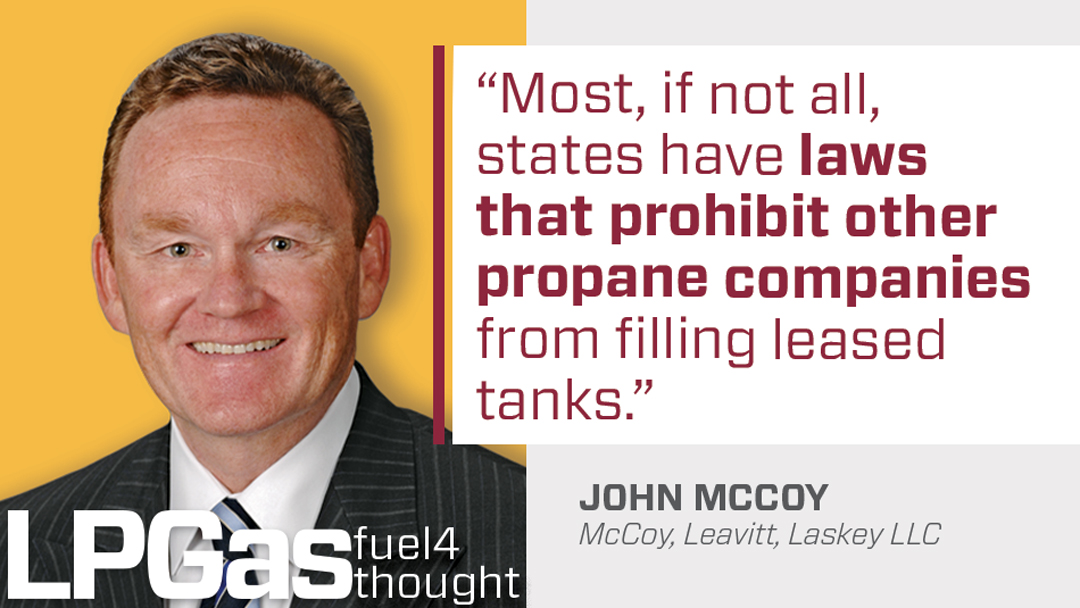Steps to take when competitors fill your leased tanks
Most, if not all, states have laws that prohibit other propane companies from filling leased tanks.
Nonetheless, from time to time, propane companies that do not own a given tank fill that tank and bill the customer in violation of most state laws.
These laws primarily allow the propane company that owns the tank to recoup the costs related to its property, i.e., the propane tank, regulators and gas lines.
These laws also enhance safety. The propane company that owns that gas system has in all likelihood done a leak check of the system and may have conducted a safety inspection of the system as well.
Moreover, if other propane suppliers intervene to fill the tank, it can invalidate degree-day calculations of fuel consumption.
Possible scenarios
A marketer can encounter many situations in which another propane company is filling its leased tank. Some marketers know the rules but skirt them to make a buck.
Sometimes tanks are at rental properties, and the new renter is not aware of the law and calls around to get the cheapest gas or the closest retailer. The retailer called may not know the tank is leased. It may assume it is a customer-owned tank if it is not marked with clear identification of ownership by the marketer to which it belongs. And it may not ask if it is owned or leased.
Marketers often become aware another retailer is filling their tanks when their delivery drivers attempt to make a delivery and a tank is full after several months since the last fill.
Solutions
This problem can be difficult to resolve. We recommend reaching out to the governing state agency that has jurisdiction over propane companies, or the authority having jurisdiction (AHJ).
Be prepared to show ownership of the tank by producing the lease with serial number, tank manufacturer and size, as well as records of delivery and past consumption. If you have records of the potential Btu-consuming appliances at the customer location and degree-day calculations, you can demonstrate that the tank is being filled by someone else. The AHJ can then investigate, find the culprit and take actions to stop that activity.
Simultaneously, you should speak with the customer that is supposed to be getting deliveries from your company and explain the law to them and why it exists. I would hope the customer would understand and agree to comply with obtaining deliveries only from your company going forward.
If you are able to identify the propane company that is filling your customer tanks, you can call and ask them to stop. You can write them and ask them to stop. You can hire a lawyer to call them and ask them to stop. Sometimes this works. Sometimes it doesn’t.
Legal action
If these steps do not stop the violations from taking place, consider taking legal action. This can include seeking a temporary restraining order in a local court to prevent your tanks from being filled by a competitor that does not own them. The restraining order can be turned into a permanent injunction stopping the competitor from ever filling your tanks again. You would want to request sanctions in terms of loss of license to sell propane and financial penalties for future violations. You may also seek damages for revenues lost by the competitor filling your tanks.
Finally, you may consider having your tank removed from the customer’s property. This can be tricky. If the customer is not cooperative, you need to be cautious about how you remove the tank. Most leases spell out that you may go on the property to remove your tank and appurtenances.
Nonetheless, you should get verbal and written permission to pick up your tank when you endeavor to do so. This will avoid any claims of trespass. Be sure you can document that you own the tank. If the customer does not give consent, you may need to initiate a replevin action to allow removal of the tank.
John V. McCoy is with McCoy, Leavitt, Laskey LLC. His firm represents industry members nationally. He can be reached at jmccoy@MLLlaw.com or at 262-522-7007.

















